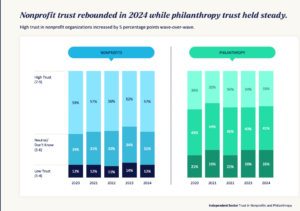Upturn In Trust For Nonprofits, Softness In The Numbers

Americans’ trust in nonprofits got a 5-point pop to 57% but that number softens significantly when it comes to the upcoming election. A plurality (41%) does not trust nonprofits to avoid partisan politics. Making matters more concerning is 30% have high trust in nonprofits for providing factual, unbiased information about political candidates and policy issues.
And perhaps underscoring the divides in the nation, new data shows that when asked if they trust people in their communities to “do what is right,” just 36% had high trust in their neighbors, down 13 points from 2023. Just two of the 16 silos tested were in positive numbers.
When comparing 2024 to 2020, which also was a presidential election year, all four areas tested in the polling were in negative numbers with private foundations taking the largest hit at 17 points from 2020. The other categories were high net worth individuals (-15%) nonprofits (-2%) and corporate philanthropy (-2%).
The greatest level of trust in nonprofits comes from people with a college degree who earn at least $75,000 annually.
This is data from new polling released today by Independent Sector in Washington, D.C. in its report “Trust in Nonprofits and Philanthropy: Strengths and Challenges in a Time of Division.”
“Trust in other sectors – like government, business, and media — continues to decline, leaving nonprofits the most trusted sector in this survey,” the authors wrote. “Trust in philanthropy remains lower than trust in nonprofits, and trust in private foundations and high-net-worth individuals remains much lower than in 2020, the first year for which we have data.”
If there is any comfort, it is that nonprofits are viewed as least likely to make things worse, with only 12% of respondents agreeing with this sentiment. In comparison, 40% said large businesses were more likely to make things worse, 59% said the federal government would make things worse and 60% indicated the media would make things worse.
In 10 silos tested for year-over-year data, nonprofits (+5) and private foundations (+6) were the only areas with positive year-over year changes when asked about trust. Corporate philanthropy dropped four points and small business did the worst, dropping 12 percentage points.
Corporate philanthropy and high-net worth individuals had high trust declines (4 and 2 percentage points respectively) with private foundations seeing an increase of five points, but all three areas were barely in the 30% area of high trust.
While 66% of respondents have high trust in human services, that was 12 points less than last year. In nine areas of nonprofits services tested, just animals and wildlife (+6) had a year-over-year increases in high trust.
Asked about homelessness, poverty, healthcare, jobs/economy and housing, nonprofits had the most trust, but government was second when it came to healthcare and housing. The two other categories were business and media. Nonprofits also had high trust in civil rights, race relations, climate change, protecting democracy and crime, with media finishing last in all areas.

When looking to solutions to bridge this divide, nonprofits are the institution respondents trust the most to make a change (45% of respondents believe nonprofits are making things better). “And with the sustained impacts of their work that respondents see and believe in to help those in need, nonprofits are one of the few societal institutions that many believe can still give them the hope they need for a better future,” according to the authors.
Nearly three-quarters of Americans (74%) said they are concerned about the country’s direction during the next 12 months, with inflation, crime, jobs and immigration being the top four issues.
This is the first time that respondents for the annual study where we asked directly about trust in advocacy and election-related activities. “Independent Sector sees those activities as crucial for nonprofits’ ability to complete their missions. Though it’s not necessarily a surprise that the public is skeptical about the sector’s ability to be nonpartisan, it is concerning,” said Independent Sector’s Director of Research and Policy Analysis Kevin Miller, Ph.D. “The understandings we’re taking from this year’s study can help inform how IS and the rest of the sector go about our work.”
Miller explained that there is some variation in trust by activity in this question. “The public has higher trust in the sector providing people with voting information than with assisting in writing/revising laws/regulations. But ideally, we’d like the level of trust we see in this question to be higher across the board,” said Miller. “We believe nonprofits play an important role in fostering a robust democracy by engaging in the activities we asked about. But as with your previous question, it’s useful for us to know that the sector may be seen with skepticism when engaging in election-related nonpartisan activities so we can adjust our approach.”
Four-fifths of Americans who volunteer said their experience made them view nonprofits more favorably. A majority of the respondents said their trust in a nonprofit would increase if organizations committed to “third party” standards for ethical operations and good governance practices.
Independent Sector worked with Edelman Data & Intelligence (DXI) on a 20-minute online survey among 3,000 U.S. adults ages 18 and older which was put in the field March 21 through April 7. Results were weighted to be a nationally representative across race, income, educational attainment, gender, age, region and urbanicity.
The post Upturn In Trust For Nonprofits, Softness In The Numbers appeared first on The NonProfit Times.









Leave a Reply